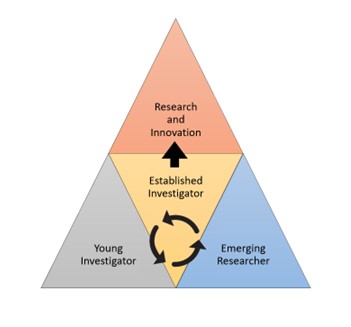The American Quarter Horse Foundation (AQHF) invites research proposals from accredited nonprofit institutions that align with AQHF's mission, objectives, and areas of research interest. Grant funding is awarded to projects that are outcome-driven and designed to make a meaningful, lasting impact on the health and well-being of the American Quarter Horse and the broader equine community.
As one of only four private institutions in the nation funding equine research, AQHF plays a critical role in supporting scientific progress. Since 1960, we've awarded more than $13 million to colleges and universities to improve our understanding of equine health, management, and overall welfare.
OUR MISSION: to advance relevant basic and applied research that enhances the well-being of the American Quarter Horse.
VISION: to foster innovative equine research and education that leverages collaborative resources with exceptional scientists to address fundamental issues facing both the AQHA membership and the broader horse industry.
 Desired Research Impact
Desired Research Impact
PROGRAMMATIC RESEARCH OBJECTIVES
Grants are awarded for proposed research meeting the following programmatic objectives identified by the AQHF Equine Research Committee.
- Enhance the well-being of the American Quarter Horse
- Advance impactful research for practical application
- Produce research innovation through basic and applied sciences
- Promote findings to peers, clinicians, and industry stakeholders
- Foster education and training of future researchers
- Increase collaboration within the research industry
AREAS OF RESEARCH INTEREST
AQHF supports research to improve knowledge for public benefit to advance the health, welfare, and utility of the American Quarter Horse. The Equine Research Committee considers all proposals meeting AQHF's mission and overarching programmatic objectives, with special attention to the following areas of interest:
Joint and Bone Health (soundness) - advancing research in joint and bone health plays a critical role in enhancing the long-term soundness, comfort, and quality of life for performance, working, and aging horses.
- Subtopics: early detection and prevention, nutrition and dietary ingredients, conditioning and training regimens, therapeutics and regenerative medicine, inflammation and immune response, developmental and growth disorders, aging, and degeneration
Training and Performance - safeguarding horse welfare in competition, while advancing training and performance practices, is vital to ensuring the ethical and sustainable future of competitive equestrian disciplines.
- Subtopics: training and performance optimization, mental wellness and welfare of the horse, competition integrity, human-induced stress factors
Reproduction and Breeding - improving reproductive health and responsible breeding practices is essential to supporting the longevity, well-being, and overall versatility of both performance and working horses.
- Subtopics: fertility optimization, disease prevention, reproductive technologies, mare and foal health, reducing reproductive losses, behavioral aspects, sustainable breeding practices
Genetics and Genomics - understanding the equine genome is foundational to improving horse health, performance, breeding, and disease prevention.
- Subtopics: mapping the equine genome, inherited diseases and disorders, behavior and temperament, performance and athletic potential, precision medicine and individualized care, reproduction and breeding practices, epigenetics and gene expression, conservation, and measures of genetic fitness
Colic - colic remains one of the most common and potentially life-threatening conditions in horses, and improving its prevention, diagnosis, and treatment is a top priority in equine health.
- Subtopics: early detection and diagnosis, understanding underlying causes, medical and surgical interventions, non-surgical treatment strategies, preventative care and management, gut health and nutrition, personalized medicine and risk assessment, epidemiological and field studies
Additional information regarding required research compliance, grant distribution policy and research reporting are provided within the AQHF Research Program Guidelines (link above). Researchers interested in submitting a proposal for the upcoming grants cycle may find more information on applicant categories, available funding, and desired grant proposal formatting through the following links:
Application Process Timeline
| Applications Open | July 1, 2025 |
| Pre-proposal Deadline | October 1, 2025 |
| Researcher Notification (full-proposal invitation from AQHF) | Week of December 1, 2025 |
| Full-proposal Deadline | February 1, 2026 |
| Committee Review of Proposals | February-April, 2026 |
| AQHF Board of Trustees Approval | May, 2026 |
| Researcher Notification | Week of June 1, 2026 |
